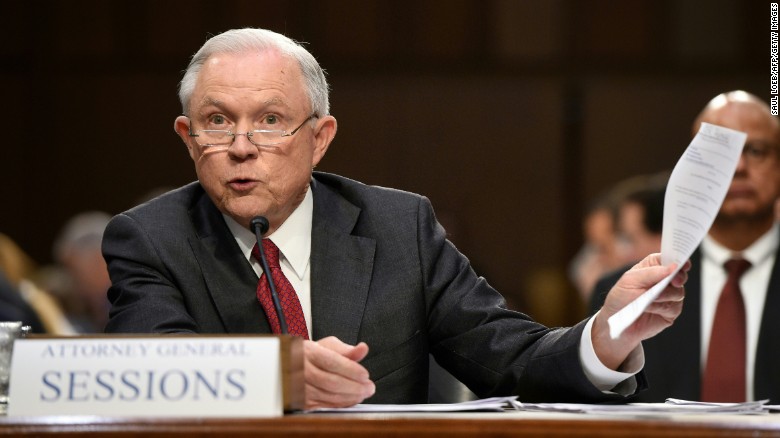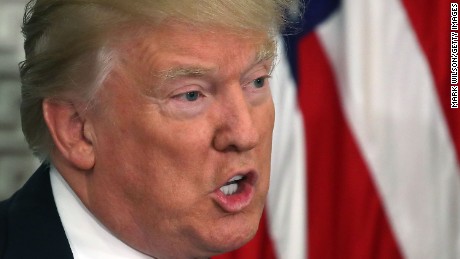Trump Seems to Want to Have The Attorney Gen.and Ass't Resigned so The New FBI Chief Would Answer to Him
For President Donald Trump, loyalty in Washington is a one-way street. But as I wonder why Trump gave that interview saying things that ordinarily would cause most people in the WH staff to resign. Actually, there are only two people maximum three at the most between him and the new FBI chief. (adamfoxie)
Trump's trashing of several of his administration's top justice officials in an interview with The New York Times on Wednesday, including Attorney General Jeff Sessions, is causing deep alarm inside the West Wing, leading some to worry that their loyalty to Trump might not be reciprocated from the man in the Oval Office.
There's also a general sense of bewilderment as to why Trump gave the interview. Health care was the focus of the day. He actually got engaged -- but then this.

Conversations with the official and one top Republican in frequent contact with the West Wing show a president who has long been angry with Sessions' decision to recuse himself from the Russia probe, but rather than subsiding and moving on as Trump sometimes does, the anger has grown into a passionate rage.
"No one was more loyal than Sessions. No one," a White House official said, speaking confidentially to avoid drawing the President's ire.
The thinking goes: If this kind could happen to Sessions, it could happen to anyone. One official described the President's blasting of Sessions as only intensifying the already low morale inside the West Wing.
Trump faulted Sessions for accepting his offer to be attorney general and then recusing himself shortly thereafter due to undisclosed contacts he had with Russian officials during the campaign. The President said those actions were "very unfair" to him.
"Sessions," Trump told The New York Times, "should have never recused himself and if he was going to recuse himself he should have told me before he took the job and I would have picked somebody else."
He added: "How do you take a job and then recuse yourself? If he would have recused himself before the job, I would have said, 'Thanks, Jeff, but I'm not going to take you.' It's extremely unfair -- and that's a mild word -- to the President."
Loyalty
The comments are a stunning rebuke from a president who craves loyalty, demanding it from those who work for him. Trump has written extensively about the trait in his books, as well, touting it as the most critical quality as a person can have.
But as Trump has eased into life in the White House, his demands for loyalty have proven to be unrequited, most recently shown by how he lashed out at Sessions, one of his earliest and most dedicated supporters.
Sessions declined to hit back at Trump during a press briefing Thursday, telling reporters that he "plan(s) to continue to do so as long as that is appropriate."
Sessions loyalty to Trump has been unflinching for years. The conservative senator was his first Senate endorsement, long before any other Republican heavyweights were on board. The senator also stood by Trump after the Access Hollywood tape controversy, where Trump was heard making lewd comments about sexually assaulting women. And Sessions even helped fill Trump's inner circle with confidants of his own, including Stephen Miller, Trump's top policy aide, and Rick Dearborn, a top White House legislative aide.
The acrimony between Trump and Sessions has long been simmering -- Sessions tendered his resignation earlier this year but Trump declined to accept it -- but Wednesday's comments signal a shift in Trump's leadership style, one that former employers used to say rested on unflinching loyalty to the company and, more importantly, the boss.
Earlier in his career, during a question-and-answer session at The Learning Annex Wealth Expo, Trump was asked for the "key things" a boss should look for when hiring someone and build a team.
"The thing that's most important to me is loyalty," Trump said. "You can't hire loyalty. I've had people over the years who I swore were loyal to me, and it turned out that they weren't. Then I've had people that I didn't have the same confidence in and turned out to be extremely loyal. So you never really know."
He brought those beliefs to Washington by bringing many of his own employees with him, but his credo now appears to be Trump asking for loyalty, not giving it back.
Trump asked fired FBI Director James Comey for his loyalty during a January 27 dinner at the White House, Comey said in written testimony to the Senate earlier this year.
"I need loyalty, I expect loyalty," Comey recalled Trump saying, adding later that the soon-to-be fired FBI director offered him "honest loyalty."
Trump later fired Comey in May, citing his disloyalty as one of the reasons in later interviews.
The President also asked Republicans in the House to stick with him on health care reform, touting the bill as "incredibly well crafted" during a Rose Garden ceremony after narrowly it passed the House. Weeks later, Trump went back on those comments and called the House health care bill "mean" in a meeting with senators.
The remark shocked some lawmakers who stuck with Trump on health care, despite the political perils.
Rep. Louie Gohmert, a Texas Republican and a member of the conservative House Freedom Caucus, was flummoxed when CNN asked him what he thought of the President calling the bill "mean."
"The one," he asked, "that he had us come over and celebrate?" Those close to Trump have long said loyalty is critical to him.
Bill Zanker, the president and founder of The Learning Annex who wrote "Think Big: Make It Happen in Business and Life" with Trump in 2009, put it bluntly in his intro to the self-help book: "Loyalty is important to Trump and is a wonderful trait to have in business."
"I try to hire people who are honest and loyal. I value loyalty very much," they wrote. "I put the people who are loyal to me on a high pedestal and take care of them very well ... I go out of my way for the people who were loyal to me in bad times."
And former employees, who requested anonymity to speak bluntly, said Trump's desire for loyalty is the reason why he brought someone like Keith Schiller, his longtime bodyguard, and adviser, into the White House. Schiller is an asset to the White House, many who know him say, but his steadfast loyalty is his biggest asset to Trump.
Trump's love of loyalty stems, according to those close to him, to his mentor Roy Cohn, who stood by Trump and his family in the face of housing discrimination and grew into his guide through the rough New York real estate industry.
"Sometimes I think that next to loyalty, toughness was the most important thing in the world to him," Trump wrote of Cohn in his 1997 Urtext "The Art of the Deal."
"He was a truly loyal guy -- it was a matter of honor with him," Trump wrote. "And because he was also very smart, he was a great guy to have on your side."
By Jeff Zeleny and Dan Merica, CNN
By Jeff Zeleny and Dan Merica, CNN

Comments